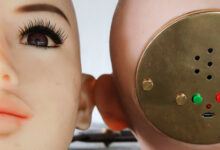Sex Robots Could Actually Worsen Loneliness, New Study Says

Sex robots might be one of the most brow-raising points of discussion in robotics, but it might not be as ‘fool proof’ as its supporters would say. A team of doctors from the UK recently reported that sex robots won’t solve feelings of loneliness or reduce the number of violent sex crimes against female sexual partners.
The new study, recently published in the BMJ Sexual and Reproductive Health, NHS doctors said there was absolutely no evidence supporting the popular claim of sex robots reducing loneliness and violence toward women.
“It remains unproven that intimacy ‘needs’ will be satisfied: there could be worsened distress,” the doctors wrote. “While a human may genuinely desire a sexbot, reciprocation can only be artificially mimicked.”
The industry, however, is booming. Sexbots like True Companion’s Roxxxy doll are going for thousands of dollars. The more a buyer pays for customization of their fantasies, the higher the price. One of the biggest claims from companies developing sex robots is an offer of substituted companionship. Supporters of sexbots have even mentioned a simplified pseudo-relationship with a robotic lover.
However, the medics behind the recent BMJ research see purchasing a sexbot as a decision that’s far from healthcare related.
“The overwhelming predominant market for sexbots will be unrelated to healthcare.”
“The overwhelming predominant market for sexbots will be unrelated to healthcare,” the reproductive health officials said.
The team of researchers even hinted that relying on sex robots for connection would actually worsen loneliness and a user’s ability to talk with potential human sexual partners in the future.
There’s also a growing level of concern around the idea of sexbots somehow reducing sexual violence against women. The NHS doctors wrote that it could actually drive further exploitation of women — especially if their partners were increasingly accustomed to minimal human connection and potentially aggressive behaviors toward a robot.
“Some people envision a future with no sex trafficking, sex tourism or sex trade,” the editorial noted. “One hypothetical future red-light district has been described where the spread of sexually transmitted infections is prevented by providing robotic prostitutes made of bacteria-resistant fibre, flushed for human fluids after use. This well-intentioned scenario is optimistic,” they write.
“It is speculative whether the development of a sexbot marketplace will lead to lesser risk of violence and infections, or drive further exploitation of human sexworkers.”
This isn’t the first time doctors have objected to the use of robotic sexual fantasies. In 2015, Dr. Kathleen Richardson led a campaign to ban the development of sex robots in the UK. Richardson worked as a robot ethicist at De Monfort University in Leicester, and she wanted to raise awareness about how sex robots affect the human psyche.
“Sex robots seem to be a growing focus in the robotics industry and the models that they draw on – how they will look, what roles they would play – are very disturbing indeed,” she said.
“We think that the creation of such robots will contribute to detrimental relationships between men and women, adults and children, men and men and women and women,” she said in an interview with the BBC.
You can read the full article from the source HERE.
-
Sale!

Aurora: Tender Sex Doll
Original price was: $2,799.00.$2,599.00Current price is: $2,599.00. Buy Now -
Sale!

Dominique: Thick Sex Doll
Original price was: $2,499.00.$2,199.00Current price is: $2,199.00. Buy Now -
Sale!

Auburn: Red Head Sex Doll
Original price was: $2,199.00.$1,899.00Current price is: $1,899.00. Buy Now






